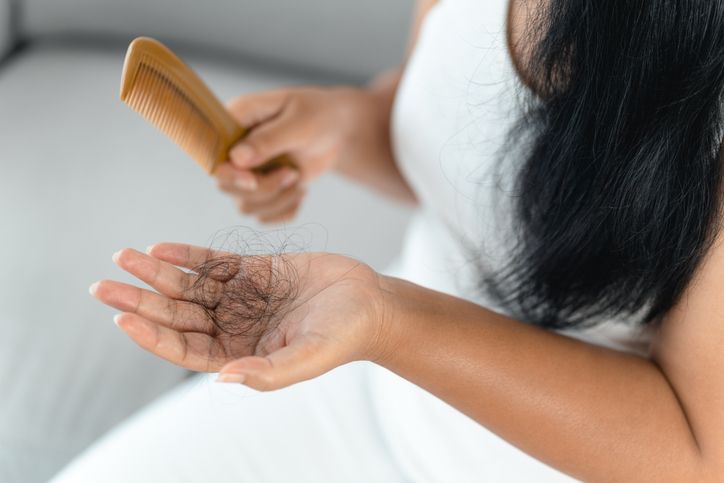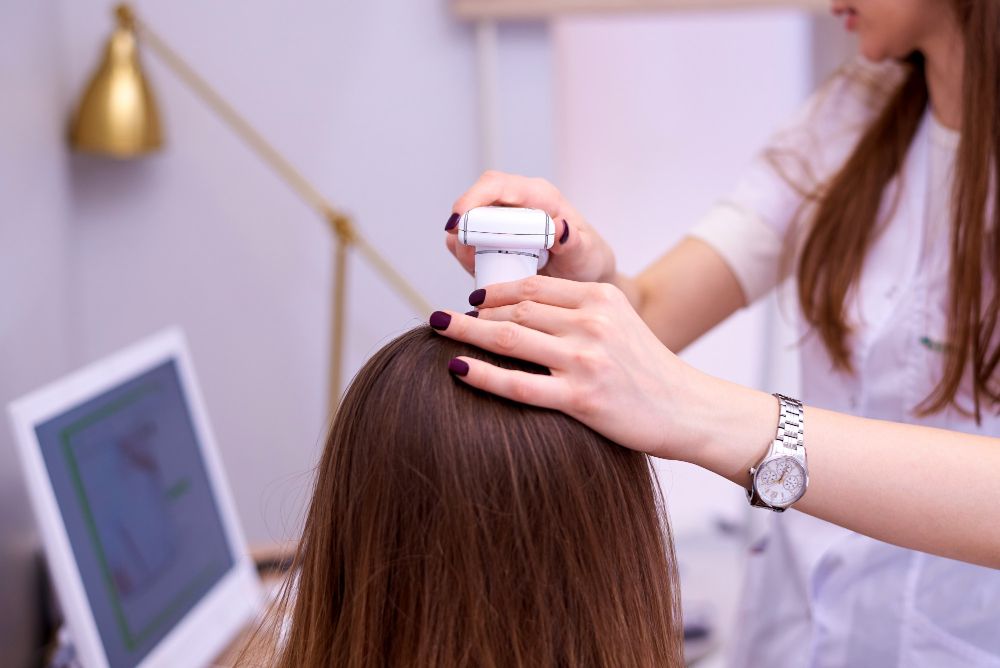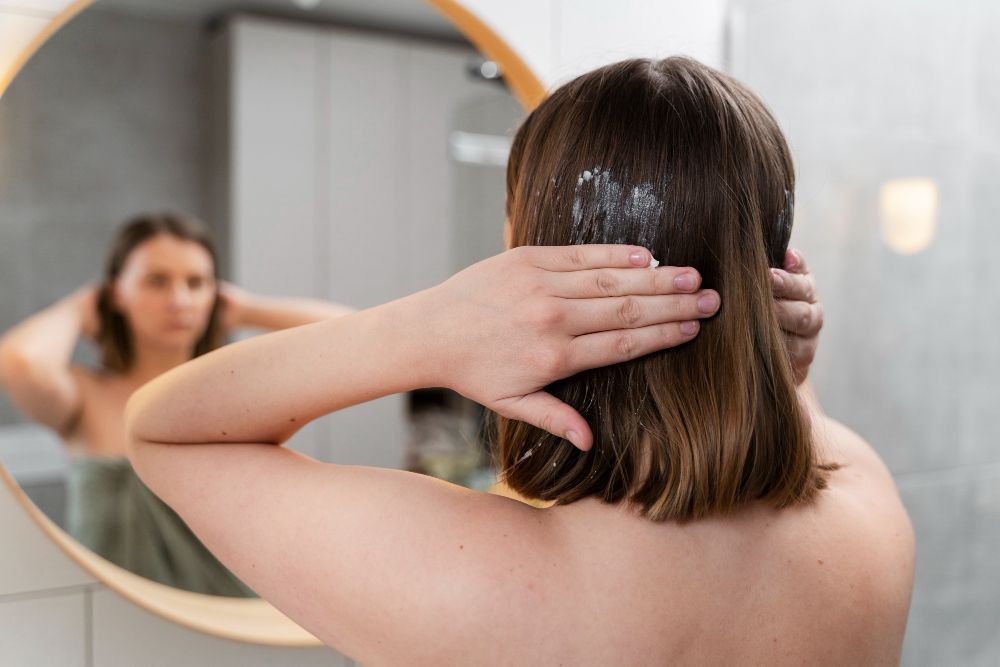- Home
- Trend
- Weight Loss Strategies
- Acne Tips
- Hair Health Information
- Blemish Removal Tips
- Acne Scar Removal Tips
- Muscle Building Techniques
- Intimate Care Tips
- Postpartum Intimate Care
- Eye Bags Wiki
- Tips for Face Slimming
- Secret of Permanent Hair Removal
- Breast Enlargement Tips
- Cure to Snoring
- Marionette Lines
- Skin-Tightening Secrets

免費體驗
F8 Hair Regrowth Treatment
1 Minute Self-Registration
Date should not be before minimal date
Your thyroid health directly affects your hair growth. Thyroid hormones are essential for maintaining healthy hair follicles, and when your thyroid is out of balance, it can lead to thyroid-related hair loss. Whether it's an overactive thyroid (hyperthyroidism) or an underactive thyroid (hypothyroidism), both conditions can result in hair thinning, hair loss, or changes in hair texture. Women are especially prone to thyroid dysfunction causing hair loss, with symptoms such as thinning eyebrows (often on the outer third) and brittle hair. If you're noticing thinning hair, hair shedding, or changes in texture, it may be a sign of thyroid problems, such as autoimmune thyroid diseases or other thyroid disorders. Addressing thyroid imbalances—whether from low thyroid hormone levels or an overactive thyroid—can help you stimulate hair growth and restore your hair’s health. By understanding how thyroid dysfunction impacts hair follicles and the hair growth cycle, you can take the right steps toward improving your hair health and promoting hair regrowth.
1
Signs and Symptoms of Thyroid Hair Loss

1. Diffuse Hair Loss
2. Brittle and Dry Hair
3. Thinning Eyebrows
4. Changes in Hair Texture and Color
5. Excessive Hair Shedding
6. Other Common Symptoms of Thyroid Dysfunction
2
Common Types of Thyroid Conditions Linked to Hair Loss

Hypothyroidism (Underactive Thyroid)
Hyperthyroidism (Overactive Thyroid)
Hashimoto’s Disease
Graves’ Disease
- 8 Key Nutrients + 7 Anti-Hair Loss Foods + 3 Nourishing Recipes To Prevent Hair Loss!
- What’s the Connection Between The Hair Growth Cycle And Hair Loss? Learn About 5 Ways To Improve Growth Phase Hair Loss!
- Can A Hairdryer Style Your Hair But Also Damage Your Hair? 4 Ways To Care For Your Hair
- Check Out Whether These 8 Hair Growth Tonic Ingredients Really Work
3
Treatment Options and Solutions

1. Hormone Replacement Therapy for Hypothyroidism
2. Treatments for Hyperthyroidism
3. Surgical Intervention for Thyroid Nodules or Cancer
4
Other Ways to Stimulate Hair Growth

1. Medicated Shampoos and Scalp Treatments
2. Nutritional Supplements
3. Maintain a Well-Balanced Diet

免費體驗
F8 Hair Regrowth Treatment
1 Minute Self-Registration
Date should not be before minimal date
5
F8 Hair Regrowth Treatment: A Non-Invasive Solution for Thyroid-Related Hair Loss

How the F8 Hair Regrowth Treatment Works
Key Benefits of F8 Hair Regrowth Treatment
6
Last Words


免費體驗
F8 Hair Regrowth Treatment
1 Minute Self-Registration
Date should not be before minimal date
FAQ

Can Pregnancy-Related Thyroid Changes Cause Permanent Hair Loss?
Pregnancy-related thyroid changes typically don't cause permanent hair loss, as the condition is usually temporary and reversible. You'll find that once your thyroid hormone levels normalize through treatment, your hair will begin to regrow, though this process may take several months. However, if you have an underlying autoimmune thyroid condition, you might experience more persistent hair loss that requires ongoing medical management.
How Long After Starting Thyroid Medication Will Hair Start Growing Back?
You'll typically notice reduced hair shedding within 2-3 months after starting thyroid medication, while new hair growth becomes visible around 4-6 months as hair follicles enter their growth phase. Significant regrowth usually occurs within 6-12 months of achieving stable thyroid levels, though complete restoration may take longer depending on factors like your age, genetics, nutrition, and the severity of your thyroid imbalance.
Does Thyroid-Related Hair Loss Affect Facial and Body Hair Differently?
Thyroid disorders can affect your facial and body hair differently, with facial hair often showing more noticeable changes. You'll typically notice eyebrow thinning, particularly in the outer third, and possible eyelash loss (madarosis) as distinctive facial signs. While body hair loss tends to be more diffuse and generalized, occurring gradually across various areas, though the specific pattern can vary depending on whether you're experiencing hypothyroidism or hyperthyroidism.
Can Stress Trigger Both Thyroid Problems and Hair Loss Simultaneously?
Imagine waking up one morning to find more hair on your pillow while feeling unusually tired - these could be connected. Yes, stress can simultaneously trigger both thyroid dysfunction and hair loss through elevated cortisol levels, which interfere with thyroid hormone production and disrupt your hair's growth cycle. You'll often notice that chronic stress impacts your thyroid function while directly causing telogen effluvium, a type of stress-related hair loss that compounds thyroid-related shedding.
Are Certain Ethnicities More Prone to Thyroid-Related Hair Loss?
Based on available research, there's no conclusive evidence showing that certain ethnicities are more prone to thyroid-related hair loss. While the prevalence of thyroid disorders can vary among different ethnic groups, studies haven't established clear ethnic-specific patterns in thyroid-related hair loss. You should be aware that thyroid conditions can affect hair growth in people of all ethnicities, and genetic predisposition to thyroid disorders may play a more significant role than ethnicity alone.









